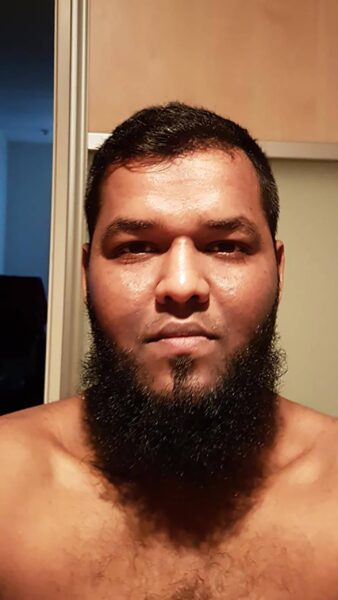NZ’s Islamic de-radicalization programme failed for the same reasons all other Western government Islamic de-radicalization programmes fail, namely they pay Muslims to run them.
Jacinda Ardern pays local Islamic organisations who believe Muhammad is the messenger of Allah to teach people to pretend to ignore the clear message of Muhammad the messenger of Allah.
These and other timeless spiritual gems have been the backbone of the global Islamic expansion: Quran 2:216. Fighting has been enjoined upon you while it is hateful to you. But perhaps you hate a thing and it is good for you; and perhaps you love a thing and it is bad for you. And God knows, while you know not.”, “3:151. We will cast terror into the hearts of those who disbelieve for what they have associated with God of which He had not sent down [any] authority. And their refuge will be the Fire, and wretched is the residence of the wrongdoers.”, “3:143. And you had certainly wished for death [i.e., martyrdom] before you encountered it, and you have [now] seen it [before you] while you were looking on.”, “2:193. Fight them until there is no [more] unbelief and [until] religion [i.e., worship] is [acknowledged to be] for God.” and “4:74. So let those fight in the cause of God who sell the life of this world for the Hereafter. And he who fights in the cause of God and is killed or achieves victory – We will bestow upon him a great reward.”

It just doesn’t make sense, yet all over the world, Western Governments continue to do this.
All over the world Muslims are mocking Western governments for paying them to teach Muslims to overthrow them! In the UK Lee Rigby’s killer Michael Adebolajo ‘works as a de-radicalisation mentor at prison where London Bridge attacker Usman Khan was held’. Here in NZ it is no different, as the many articles in this website show.
For example, Massey university employ Byron Clark to teach on countering hate speech, yet Byron Clark openly campaigns to remove NZ terrorism laws!
Likewise, the NZ trade unions openly support global terrorist fundraiser HAMAS, sponsoring protests in their honour in our largest cities. these same trade union activists openly advocate to arm and train people who hate the NZ government to use weapons, as their own promotional videos show. Many members of NZ’s own Islamic State community, formerly known as the Aotearoa Maori Muslim Association, can be seen openly calling for Jihad in videos of the event.
NZ’s Islamic de-radicalization programme failed because they ignored the advice of Yahya Cholil Staquf, who is General Secretary of Nahdlatul Ulama, the world’s largest Muslim organisation, who in 2019 after Tarrant’s shooting said:
“There is a desperate need for honest discussion of these matters. This is why it worries me to see Western political and intellectual elites weaponise the term “Islamophobia,” to short-circuit analysis of a complex phenomenon that threatens all humanity. For example, it is factually incorrect and counter-productive to define Islamophobia as “rooted in racism,” as proposed by the All-Party Parliamentary Group on British Muslims. In reality, it is the spread of Islamist extremism and terror that primarily contributes to the rise of Islamophobia throughout the non-Muslim world.”
NZ’s Islamic de-radicalization programme failed because the government refused assistance from those who have escaped the doctrines themselves.
Education defeats Islamic ideology. All over the world Millions of people are leaving the world’s biggest terrorist organisation. Islam isn’t a religion in the traditional Western sense of the word. It’s not an army, or a nation, or a war to be fought. It’s an ideology that has been slowly constructed and manipulated over the last 1300 odd years by those wishing to gain power and control over those around them.
Because Islam is only an ideology, you don’t need weapons to combat it. All one is required to do is educate it’s adherents to the origins of their ideology so they too can see how texts and events have been manipulated to bring them under control.
NZ’s Islamic de-radicalization programme failed, and will continue to fail, as long as the government ignore history.

Police were justified in fatally shooting the LynnMall terrorist but an extensive multi-agency review has found several shortcomings in the way Ahamed Aathil Mohamed Samsudeen was managed in the years prior to his knife attack.
The review, authored by the respective oversight bodies of police, Corrections and intelligence agencies, stressed those involved in Samsudeen’s surveillance did their best in an unprecedented situation, but it has recommended changes to future approaches to radicalised individuals who pose a threat to New Zealanders.
The shortfalls identified included missed opportunities to provide rehabilitation, insufficient coordination between agencies, a reluctance to share information about the risk Samsudeen posed and placing Samsudeen in custody on remand for an “unacceptably long” period which “greatly exacerbated his risk of causing harm”.
The Government has accepted all of the findings and has committed to adding to existing legislative and agency change with the aim of addressing signs of people’s radicalisation to violent extremism earlier.
Samsudeen, originally from Sri Lanka, had been released from prison in July, 2021 after being convicted of two charges of possessing objectionable material relating to ISIS, and one charge of failing to assist a police officer exercising a search power.
In 2017, he had reportedly expressed a desire to fight for ISIS in Syria, and that if he was prevented from travelling there, he would commit a knife attack in New Zealand.
On September 3, Samsudeen entered a supermarket within New Lynn’s LynnMall shopping centre in Auckland and eight people were injured as Samsudeen carried out a mass stabbing.
Police officers, who had been tasked with surveilling Samsudeen following his release from prison, shot and killed him in the supermarket.
The Independent Police Conduct Authority, one of three bodies included in the joint review, found the officers were justified in their response to the threat posed by Samsudeen.
“[Officers] believed Mr Samsudeen had advanced on them with the knife, posed an immediate threat of serious harm or death to them at the time they fired the shots, and posed a continuing serious threat to supermarket shoppers if they were unable to stop him,” authority chairman Judge Colin Doherty said.
“They were justified in shooting at Mr Samsudeen in self-defence under section 48 of the Crimes Act 1961.”
Alongside police, the New Zealand Security Intelligence Service (NZSIS) and Corrections were the chief agencies responsible for Samsudeen’s management and as such, their respective oversight bodies were involved in compiling the review – the Inspector-General of Intelligence and Security, and the Office of the Inspectorate.
It was acknowledged early in the report individuals and agencies were doing their best to deal with an “extremely difficult situation.
“Mr Samsudeen was a very challenging person for them to engage with, and we were told that they faced problems they had never before experienced to that degree.”
While the authors stated it was not intended to direct criticism or suggest solutions, four primary deficiencies were identified.
The first concerned how a strong focus on Samsudeen’s arrest and prosecution led to missed opportunities to develop a rehabilitative and reintegrative plan prior to and after his imprisonment.
“Overall, not enough effort was made at an early stage to provide Mr Samsudeen with wraparound support to address his complex needs and reduce his susceptibility to violent extremist ideology,” the report said.
“Although the agencies said disengagement (withdrawal from violent extremism) was the preferred outcome, very little was done to achieve this.”
The lack of an inter-agency process to determine when intervention was needed and “ad hoc” preventative measures run mainly by police limited the capacity for timely and effective means to steer Samsudeen away from violent extremism.
The second deficiency referenced issues in how the National Security System was run, under the leadership of the Department of the Prime Minister and Cabinet (DPMC).
The report cited discussions with DPMC that indicated DPMC officials did not see their role as “marking other agencies’ homework”.
Report authors believed that was necessary and advised the establishment of an independent and operationally-focused oversight mechanism with a mandate to “provide leadership and facilitate the application of resources”.
The third spoke of how highly relevant information to the management of Samsudeen’s risk was not shared due to a “very restrictive interpretation” of who needed to be informed.
One example concerned how information known about Samsudeen was withheld from police’s M?ori, Pacific and ethnic services, even when they were asked to convene a meeting with the Muslim community to discuss the matter.
The final shortcoming in Samsudeen’s management was the “unduly lengthy period” he spent in custody on remand that was extended by approximately 18 months through several factors including Covid-19 lockdowns.
“We believe this magnified Mr Samsudeen’s sense of grievance against the system, greatly increased his alienation, hostility and risk of increased radicalisation, and precluded agencies from properly considering other options for addressing the problem that he undoubtedly presented.
“We cannot say whether his attack would have occurred anyway, but his period in custody without the appropriate and necessary interventions and support enhanced the risk that it would.”
Andrew Little, the lead minister for the Government’s response to the Royal Commission’s Report into the Christchurch terror attack, acknowledged the survivors of the LynnMall attack in his welcoming of the report’s findings.
“While no recommendations were made in the review report, we’re committed to working through the findings to ensure improvements can continue to be delivered across the system,” Little said.
“The Government’s commitment is to learn from the two terrorist attacks we have experienced in recent years and to take all possible steps to ensure a safe, secure and resilient Aotearoa New Zealand.”
He referenced legislative changes to the Counter-Terrorism Legislation Act and the Films, Videos, and Publications Classification Act to enable faster interventions for individuals and to prevent harm from objectionable publications.
Police Commissioner Andrew Coster acknowledged the report’s findings but also stood by the actions of police, indicating the limitations of interventions in this case.
“Our view was that this individual was already radicalised before he first came to the attention of the authorities and was taking preparatory steps towards undertaking a terrorism offence,” Coster said.
“Ultimately, despite our attempts, the individual chose not to engage with any party.”
NZSIS Director General of Security Rebecca Kitteridge said the report proved her agency had acted appropriately with respect to information sharing and its inability to inform rehabilitative measures.
“No intelligence was found to be withheld and information was supplied at the lowest classification settings possible, to ensure the right people had the right information at the right time,” she said.
“There may be times when our intelligence and expertise can help to inform a rehabilitative approach, but NZSIS does not have any legislative function or capability to provide or facilitate rehabilitation programmes or social services.”
Failures identified in management of LynnMall terrorist before mass stabbing

